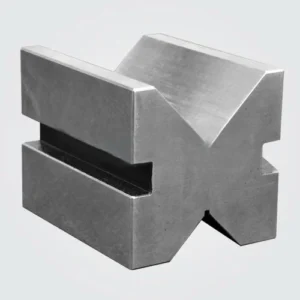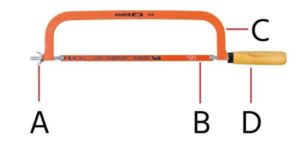Q. Which caliper is used to mark center of a round bar?
(A) Inside caliper
(B) Outside caliper
(C) Jenny caliper / odd leg caliper
(D) Vernier caliper
Q. Name the angle measuring instrument
(A) Vernier caliper
(B) Micrometer
(C) Scriber
(D) Bevel Protractor
Q. Bench vice is a-
(A) Marking device
(B) Job holding device
(C) Measuring instrument
(D) cutting tool
Q. What is the name of the tool shown in the figure ?

(A) File
(B) Scriber
(C) Cutting tool bit
(D) Chisel
Q. The teeth of hacksaw blade are bent
(A) towards right
(B) towards left
(C) alternatively towards right and left and every third or fourth left straight
(D) may be bent in any direction
Q. A hacksaw blade cuts on the
(A) forward stroke
(B) return stroke
(C) both forward and return strokes
(D) cutting depends upon direction of the cutting force
Q. Which type of file is used for wood work?
(A) single cut file
(B) double cut file
(C) rasp cut file
(D) any one of these
Q. Vernier constant /least count of a vernier caliper is
(A) 0.002 mm
(B) 0.2 mm
(C) 0.01mm
(D) 0.02 mm
Q. Which operation is to remove burrs from a plate after cutting?
(A) Brushing
(B) Scraping
(C) Filing
(D) Chiselling
Q. Identify the tool shown in the figure.

(A) Surface Block
(B) V Block
(C) Bench vice
(D) Pipe vice
Q. Name the part marked as ‘X’ and ‘Y’

(A) Anvil and spindle
(B) Spindle and support
(C) Spindle and ball
(D) Anvil
Q. What is the accuracy of metric outside micrometer ?
(A) 0.001 mm
(B) 0.01 mm
(C) 0.1 mm
(D) 0.02 mm
Q. Name a cutting tool material
(A) High carbon steel
(B) Mild steel
(C) Al
(D) Cu
Q. To prevent the body of the blade for jamming in the saw cut, the teeth of blade are
(A) Strengthened
(B) Sharpened
(C) Set
(D) All of the above
Q. Name the tool used to check squareness of a workpiece
(A) Steel rule
(B) Wire gauge
(C) Jenny caliper
(D) Try square
Q. Name the part marked as ‘A’ in the figure

(A) Body
(B) Wing nut
(C) Lock screw
(D) Tang
Q. Name the instrument used for indirect measurement.
(A) Steel rule
(B) Caliper
(C) Verrnier caliper
(D) Micrometer
Q. Name the tool, Which is used for laying out large circle is
(A) Divider
(B) Jenny caliper
(C) Trammel
(D) Scriber
Q. The point angle of center punch is
(A) 30º
(B) 60º
(C) 90º
(D) 120º
Q. Scriber is made of
(A) Copper
(B) High carbon steel
(C) Mild steel
(D) Cast iron
Q. The minimum measurement that can be correctly read with a Vernier caliper is called
(A) zero reading
(B) least count
(C) main scale reading
(D) actual reading minus zero error
Q. Vernier depth gauge is used for measuring
(A) external dimensions
(B) internal dimensions
(C) step, depth of blind hole
(D) pitch diameter
Q. The least count of the vernier caliper is equal to
(A) value of 1 V.S.D. – value of 1 M.S.D.
(B) value of 1 M.S.D. – value of 1 V.S.D.
(C) value of 2 M.S.D. – value of 1 V.S.D.
(D) value of 1 M.S.D. + value of 1 V.S.D.
M.S.D= Main scale division
V.S.D = Vernier scale division
Q. Micrometer works on the principle of
(A) screw
(B) bolt
(C) stud
(D) nut & bolt
Q. Increase of carbon content in steel results in
(A) Increase in hardness
(B) Increase in malleability
(C) Increase in ductility
(D) Increase in strength
Q. A hole, which is not made through full depth of the component is known as
(A) core hole
(B) blind hole
(C) pinhole
(D) bore hole
Q. The length of hacksaw blade is measured from
(A) centre of one pin hole to the centre of other pin hole
(B) end to end of blade
(C) one end of the toothed portion to the other end
(D) end of one hole to the end of the other pin hole
Q. The point angle of twist drill for general purposes is
(A) 135°
(B) 118°
(C) 90°
(D) 60°
Q. The point angle of twist drill depends upon the
(A) cutting speed
(B) material to be drilled
(C) type of the drilling machine
(D) size of the drill
Q. The material of twist drill is generally
(A) H.S.S.
(B) Mild steel (MS)
(C) Diamond
(D) Cast iron